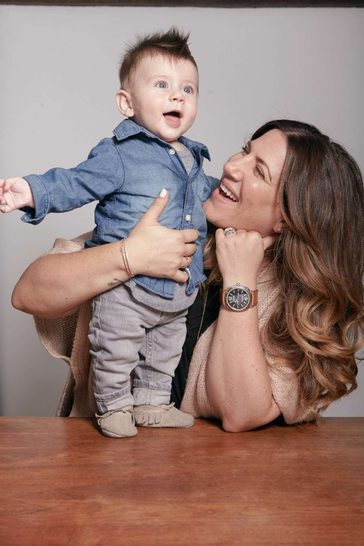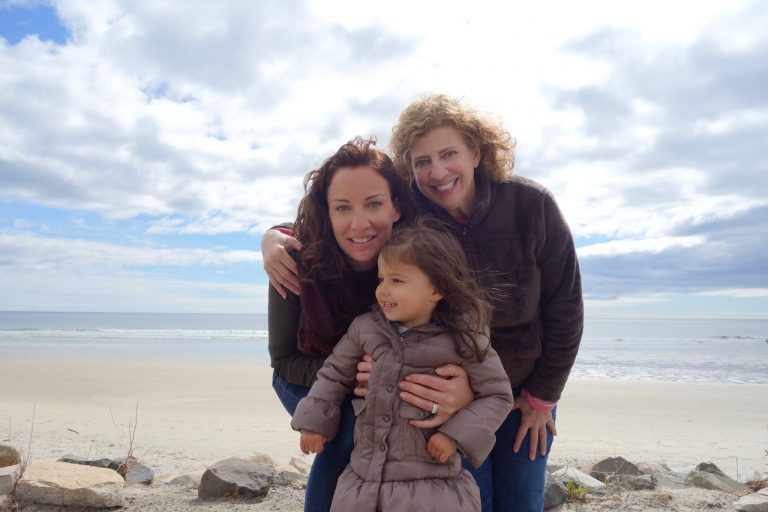|
One month ago, my very dear friend Lara Hogan was interviewed by NPR for a piece on the connection between high risk pregnancies and heart disease. This interview explored the fact that “women with high risk pregnancies are up to eight times more likely to have heart disease later in life”. This is something we all need to be more aware of. Lara’s heroic story of her dramatic and intense delivery and subsequent posteclampsia is a story we should all read and become familiar with. And as Lara stresses, it’s so unbelievably important that we care for not only our babies after childbirth, but ourselves. Bottom line mamas: pay attention to your heart’s health.
SSP: I understand you had been treated for hypertension prior to your pregnancy. How did that affect your pregnancy, and were you monitoring your blood pressure throughout? I went to a high risk doctor early on in my pregnancy because of my age and because of my genetic hypertension, and as we were watching my blood pressure we decided I’d take blood pressure medication to keep my numbers in check. We were monitoring it closely at both the OB and high risk office. They explained to me their concerns and what I needed to look for in terms of preeclampsia warning signs. Two times during the pregnancy I had to check for protein in my urine, which is the key sign for preeclampsia. Those came back OK and it wasn’t until 36 weeks that everything changed. SSP: Where there any complications or side effects that you experienced during your pregnancy? I had the craziest, biggest swollen feet you’ve ever seen, which is something that many women get. I don’t know if it was necessarily because of high blood pressure, but I tend to swell and think it’s linked my blood pressure. They were crazy huge and very uncomfortable. I had to buy a size 11 pair of vans to fit my feet. Other than that I didn’t notice anything else. SSP: When did you notice a drastic change, and how did that affect your delivery? So it really was the first day of turning 36 wks. That evening we hosted a birthday party at my house and everybody fell asleep watching a movie afterwards. I felt a little uneasy…I got up and started cleaning the kitchen, and while cleaning, I could literally feel my blood pressure rising…which is not something most people can physically feel. It’s hard to explain what it feels like. My heart was fluttering, my body was a little flushed and tingly. I decided to check my blood pressure. It was 190 over 120, an extremely high number. Normal is somewhere around 120 over 80. I woke my husband up and told him we needed to go to the hospital. I knew something was wrong. My OB had told me at my 1st appointment we have to get you to 36 weeks at the earliest. It’s very strange that it was to the day my 36th week. We drove to the hospital, we live far from it – about a 45 minute drive. We went to the ER and they immediately sent us up to the maternity ward. They checked vitals and the doctor who saw me left the room after the 1st check and came back 10 min later saying “we spoke to your doctor…looks like we’re having a baby tonight”. Within 10 minutes Chad, my husband, was in scrubs. We had to wait a few hours until 5 in the morning…so we snuggled and slept until then. I called my mom, and she flew in right away. We went into the operating room, they administered anesthesia, then Chad came in and they started cutting me open for the c-section…when I said “OW”. They cut through the uterus wall and I could feel it. They shouted “everybody stop”!!! That’s the last thing I remember. They brought me emergency anesthesia and I was totally knocked out. I woke up in the recovery room, in the dark. I had a full blown panic attack – where is my baby, where is my husband…I’m totally alone. Chad was in the NICU, with our baby boy. Boys have a much higher rate at 36 weeks to go into NICU, where he ended up spending a week. I got sent up to the high risk maternal unit. The hope with preeclampsia is that it goes away with delivery, that’s the way to get rid of it. My blood pressure however would not go down, and it was really, really high. I had to be monitored, on the cuff and on all of the special monitoring units. A few hours later it shot up even higher. They had to give me an IV of magnesium, which is supposedly the only way to get it down if it doesn’t go down on it’s own. It’s to prevent seizures, the biggest fear with preeclampsia. I couldn’t leave my bed, this is the worst part of it. I still had not seen my son. I saw pictures of him on the phone from Chad. I was so emotional – I can’t see or touch my own child at this point. He’s in the NICU, I’m worried about him. I can’t see him until my numbers regulate. Forty-eight hours later, I had my “Meryl Streep” moment as my husband calls it. I yelled “If you want my blood pressure to go down, I need to see my baby”! I called my doctor, got into a wheelchair hooked up to IV, and got to the NICU. Meanwhile l’m learning how to pump, trying to get any colostrum to him and waiting for my milk to come in. Finally I saw my son Zion and it was obviously the best moment of my life, it seemed to make everything better. I was sent home a few days later when my numbers were close to normal. Having to leave him in NICU was hard but he was in great hands. Unfortunately, that same night I felt that same feeling as the night I went into the ER. I called my sister, a doctor in NYC, and she freaked out (she does not get worked up over anything). She called my mom and she immediately took me to the ER. This was actually more scary for me than the first time. At this point I have a baby – this time i have a baby who needs me – I can’t die. I’m on the stretcher, and my numbers are so high that they had to call the resident down from the high risk unit to watch me and not leave my side for fear of seizure. This is now called posteclampsia, There is very little research on preeclampsia, so you can imagine how little research there is on posteclampsia. It’s so rare and unheard of. A lot of people don’t know what to do about it. I was hoping to avoid the magnesium again, which by the way I forgot to tell you is like getting the worst flu of your life. Imagine a c-section, not seeing your baby and having the worst flu in your life. You can’t keep your eyes open for more than a few minutes at a time, and that was when I was pumping. Anyway, I couldn’t avoid the magnesium. I started tasting metal in my mouth. A nurse was standing over me with a paddle, five doctors around me . A crew followed me because of the fear of seizures. I had no appetite, I was just so sick. I got through that, my numbers got better, and Zion and I got to go home a week later. Unfortunately, that was not the end of the nightmare. I was really sick for more than 6 weeks. We were trying to regulate my medication. My doctor had connected me with a group of doctors at Cedars-Sinai called the Barbara Streisand Women’s Heart Center, where they have a research group focused on women’s high risk maternal health issues. I joined the registry and became supervised by these amazing doctors who were getting as much out of me as a patient that I was out of the doctors. They are trying to raise awareness about the high risk of heart disease in women who have high risk pregnancies. That is why I ultimately did the NPR interview. So, throughout those weeks, I worked closely with my doctors to find the right medicine and dosage. That meant being very sick and not being able to even change a diaper until 6 weeks in. That was so incredibly difficult. My mom and my husband are my heros, they never left my side. They fed me, set my pump up and took care of Zion during the day. I had a postpartum doula at night as I couldn’t really get out of bed. From 9pm to 6am the doula would get up with him, change him, bring him to me and put him back down. I needed that extra help for 6 plus weeks. Needless to say, this was not how I had dreamt of my birth experience. SSP: How do you personally care for your heart’s health since the birth of your son, Zion? I am on routine medication, I go for checkups with my women’s care doctors. I try to keep on top of monitoring my blood pressure but again I can usually feel when it’s not right. I live a healthy lifestyle as much as i can. Eating right and exercising. SSP: Do you have any words of wisdom you’d like to share with expecting moms who have had complications in pregnancy and are concerned about their blood pressure? I definitely can’t stress enough that every mom who has a high risk pregnancy should go to a cardiologist after having the baby. We’re so focused on the new baby, it’s hard to focus on ourselves but we need to. This is for long term care of you and your heart. Preeclampsia, diabetes, any issue. Also, if you know you are at risk for any of these issues, find the right high risk doctor as soon as you can. Mine was my guide through all of this. Make sure you have a supportive team getting you through whatever you need to get through. For a link to Lara’s recent NPR interview, go to: http://www.npr.org/sections/health-shots/2017/07/10/535644276/women-with-high-risk-p by Jen Valu
0 Comments
Leave a Reply. |
Jen Valu
|



 RSS Feed
RSS Feed




